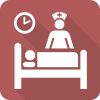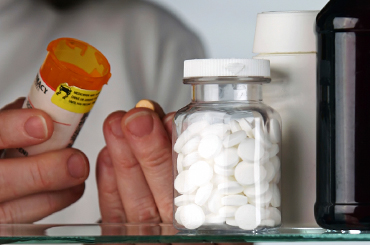- Signs and Symptoms of Hydrocodone Abuse
- Diagnosing Hydrocodone Abuse
- Effects of Hydrocodone Abuse
- Combining Substances
- Who is at Risk for Addiction?
- When to Seek Help
- Help for Addicted Friends and Family
- Hydrocodone Rehab and Treatment
- Teen Hydrocodone Abuse and Addiction
What is Hydrocodone?
Every year, millions of people develop chronic coughs, and many doctors respond by writing prescriptions for hydrocodone, a synthetic opioid that's
chemically similar to heroin.
The drug's highly addictive nature means that a small number of users are doomed to develop addictions.
Signs and Symptoms of Hydrocodone Abuse
Hydrocodone is an opiate, which means that it helps dull pain, reduces coughs, and slows down activity in your brain and spinal cord.
For most people, the drug is safe to take on a short-term basis to treat coughs and colds, but only with a prescription.
Recreational users and those who have become accidentally addicted after receiving a medical prescription for the drug may exhibit a number of symptoms, including:
- Frequent gastrointestinal problems.
- Depression and detachment.
- Secretive behavior about their drug use.
- Neglecting family, career, and household responsibilities.
99% of hydrocodone consumption occurs within the US. Throughout most of the world, hydrocodone is viewed as a potentially addictive and dangerous narcotic.
American consumers, though, continue to love the drug.
Diagnosing Hydrocodone Abuse
There's no test for hydrocodone abuse. Instead, doctors rely on accounts from the addict and his or her family and loved ones.
Clinically speaking, addiction has two hallmarks:
- Physical dependence on the drug that gives rise to intense physical and psychological symptoms when you attempt to quit using.
- Continuing to use the drug in spite of negative consequences, such as:
- Health problems.
- Family conflict.
- Financial difficulties.
If you experience either of these symptoms, you have an addiction.
Effects of Hydrocodone Abuse
Long-term hydrocodone abuse steadily destroys your health, alters the way your brain works, and creates an increasingly intense need for larger and larger doses of the drug.
Some of the long-term effects of hydrocodone addiction include:
- Depression, anxiety, and mental illness.
- Trying other opioids, including heroin.
- Brain damage, memory loss and loss of intelligence.
- Coma and sudden death.
- Difficulty sleeping.
Hydrocodone addiction can lead to coma and even death.
- Skin and tooth damage.
- Organ damage and organ failure.
- Relationship, career, financial and legal problems.
- Arrest and incarceration.
- Vomiting, nausea and diarrhea.
- Weight loss and malnutrition.
The effects of prolonged hydrocodone abuse can be quite serious.
Combining Substances
Hydrocodone is an opioid, which means it's chemically similar to street drugs such as heroin.
Don't be fooled by its legal status; this drug can kill, especially when mixed with other central nervous system depressants such as alcohol and sleeping pills.
Even if you've successfully mixed drugs before or have been using for years, the results of hydrocodone are unpredictable, which means that your next hydrocodone binge could be your last.
Legendary actor Philip Seymour Hoffman lost his life after mixing opioids with other drugs, and thousands of lesser-known people have as well.
Who is at Risk for Addiction?
Hydrocodone is one of the most popular prescription drugs, making it readily available both to sick people and those who intend to use it for its mind-altering effects.
Anyone who uses hydrocodone is at risk for developing an addiction, especially when using the drug on a long-term or recreational basis.
Other factors can also increase your risk of developing a chemical dependency, such as:
- A history of trauma or mental illness.
- A dysfunctional living environment.
- Chronic pain.
- A family legacy of addiction.
When to Seek Help
The popular media portrays addicts as hapless losers who turn abusive and violent with virtually no warning.
Perhaps loved ones have left you feeling judged or shamed. Or maybe you're so overwhelmed by guilt that you can't confess your addiction to anyone.
The truth is that addiction is a disease. It's not your fault; after all, who would willingly allow a drug to control his or her life?
Denial may spare you some pain now, but it only allows your addiction to fester and get more out of control.
If you're worried you have a hydrocodone addiction, today is always the best time to seek treatment, since addiction means that tomorrow will never come.
Help for Addicted Friends and Family
 Narcotics Anonymous offers a 12-step approach to addiction recovery, with meetings all over the country. Find a meeting near you.
Narcotics Anonymous offers a 12-step approach to addiction recovery, with meetings all over the country. Find a meeting near you.
Addiction doesn't just harm addicts. It also leaves loved ones feeling helpless, overwhelmed and sometimes angry.
Hydrocodone addicts can lose their connections to those around them and may appear totally emotionless and uncaring.
If someone you love is struggling with addiction, know that this is not their fault. Addicts need and deserve treatment, so encouraging your loved one to pursue treatment--and offering them support if they opt to do so--is one of the very best things you can do to help get your loved one clean and sober.
Of course, you can't force someone to seek help. Addicts can only recover when they're fully ready to. So if you need extra help to cope with the pain of loving an addict, consider joining a family support group, such as the one offered by Nar-Anon.
Hydrocodone Rehab and Treatment
You might think that pursuing hydrocodone addiction treatment means packing up your life and moving to a far-flung rehab center away from your friends and family. But a continuum of addiction treatment options can help you get sober.

Outpatient Treatment
Outpatient treatment is a treatment that allows you to continue living your life while attending recovery sessions during the day.
The intensity of outpatient treatment varies from program to program, and you can blend several options together to customize a plan that works for your life and your recovery goals.

Intensive Outpatient and Partial Hospitalization
Intensive outpatient and partial hospitalization programs offer similar services to inpatient rehab, but you attend sessions during the day and return home at night.

Therapy
Therapy gives you the chance to explore why you became an addict, address any underlying mental health issues, and establish a toolbox of strategies for coping with everyday stress.

12-Step Groups
12-step groups such as Narcotics Anonymous steadily move you through the recovery process by helping you make amends, rebuild your life, and gain the support of a community of recovering addicts.

Medical Detox
It's the physical dependency of addiction that makes hydrocodone so hard to quit. Medical detox helps keep you safe as you get clean, and your doctor may even be able to prescribe drugs to make the process of achieving sobriety a bit less painful. Most medical detox programs are outpatient, but some require a brief inpatient stay.

Inpatient Treatment
Inpatient care offers 24/7 support in a sober living environment, making it much easier to maintain the motivation and will to stay sober. Most inpatient facilities rely on a combination of therapy, medical care, 12-step programs, and both formal and informal support groups.

Luxury Rehab
Luxury rehab offers the highly effective treatment of traditional rehab but in a relaxing spa-like setting. Your facility may look more like a hotel, with plenty of access to holistic wellness services, classes, and comfortable and spacious surroundings. At most facilities, you can have a private room, and may even be able to request a particular room size or view.

Executive Rehab
Executive rehab facilities offer many benefits similar to luxury rehab centers, but these facilities cater to busy professionals. Privacy is of paramount importance, and residents have access to business services, the Internet, and even space where they can discreetly meet with clients or business partners.
To get the most out of inpatient treatment, it's wise to
ask plenty of questions, then only choose a facility at which you feel supported and where your values are respected.
We are here to help you assess your options and find hydrocodone treatment centers in your area that are suitable for your needs. Please call our toll-free hotline at
1-888-993-3112Who Answers?.
Teen Hydrocodone Abuse and Addiction
Hydrocodone can stunt a teen's intellectual, psychological and social development.
If you think the biggest threat to your child is from street drugs, think again. A parent's medicine cabinet provides ready access to a host of mind-altering substances.
If you don't routinely cull your medical cabinet and toss old drugs, your child may use hydrocodone and other substances, completely escaping your notice.
If you catch your child using hydrocodone, talk to him/her about the perils of prescription drug abuse. As many as 80% of teens mistakenly believe that prescription drugs are safer than illegal drugs, so early intervention can prevent your child's recreational use from becoming an addictive habit.
If your child's already hooked on hydrocodone, you need to act quickly.
Hydrocodone can stunt a teen's intellectual, psychological and social development, and stunted growth only offers one more incentive to turn to drugs as a coping tool.
Likewise, blowing up or punishing your child may only further encourage him or her to rely on drugs in order to manage stress.
Drug addiction is not a choice, so if your child shows signs of hydrocodone abuse, prompt treatment is key to his lasting recovery and well-being.




